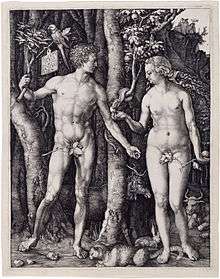Evangelical and Ecumenical Women's Caucus
 Christianity and gender | ||||||||||
|---|---|---|---|---|---|---|---|---|---|---|
| Theology | ||||||||||
|
||||||||||
| Four major positions | ||||||||||
| Church and society | ||||||||||
| Organizations | ||||||||||
|
||||||||||
| Theologians and authors | ||||||||||
|
||||||||||
The Evangelical and Ecumenical Women’s Caucus (EEWC), also known as Christian Feminism Today (CFT), is a group of Christian feminists organized in 1973. It was originally named the "Evangelical Women's Caucus" (EWC) because it began as a caucus within Evangelicals for Social Action, which had issued the "Chicago Declaration." Among the ESA participants were a few women who were concerned about the inferior status of women in Church and society and who called upon the group to consider issues related to sexism from a Christian perspective.[1]
At ESA’s second consultation in 1974 the women’s caucus was one of six task forces or caucuses formed by ESA participants to study such concerns as racism, sexism, peace, and simpler lifestyles.[1] Thus the group was born as the Evangelical Women’s Caucus (EWC). Its mission is to "support, educate, and celebrate Christian feminists from many traditions."[1] The group presented proposals to Evangelicals for Social Action on a variety of topics including endorsement of the Equal Rights Amendment, support for inclusive language in Bible translation and Christian publications, affirmation of the ordination of women, and criticism of discriminatory hiring policies in Christian institutions.[1] "Ecumenical" was added to the organization's name in 1990 in order to make it clear that members from all faiths are welcome.[1]
The Evangelical and Ecumenical Women's Caucus has a stated purpose: to encourage and advocate the use of women’s gifts in all forms of Christian vocation; to provide educational opportunities for Christian feminists to grow in their belief and understanding; and to promote networking and mutual encouragement within the Christian community.[1]
The organization identifies as a group of Christian feminists who recognize a biblical call for equality. Under their website's section titled "Who We Are" they state:
CFT is a community faithful to Christ’s example, pursuing social justice and offering radical welcome to all. We believe God created each of us in the divine image for relationship with God and one another. We believe we are divinely called to do God’s will by sharing our most authentic selves responsibly in church, home, and society. We believe answers to hard questions can be found through careful feminist examination of the Bible. We value diverse religious experiences. We value the gifts God has given every individual and have long advocated for the full equality of women and LGBTQ people in church and society. We expand metaphors for God to include biblical female imagery.
In 1986 EWC passed a resolution stating: "Whereas homosexual people are children of God, and because of the biblical mandate of Jesus Christ that we are all created equal in God's sight, and in recognition of the presence of the lesbian minority in EWCI [Evangelical Women's Caucus International], EWCI takes a firm stand in favor of civil rights protection for homosexual persons." [2] This resolution led a group of more conservative members to form Christians for Biblical Equality.[3]
EEWC maintains a website at www.eewc.com, Christian Feminism Today, edited by Marg Herder, who took over after the retirement of Letha Dawson Scanzoni, co-author of All We're Meant to Be (1975, 1992), Is the Homosexual My Neighbor?(1978, 1994), and What God Has Joined Together? The Christian Case for Gay Marriage (2005). Frequent contributors include Virginia Ramey Mollenkott, author of Women, Men, and the Bible (1977), Omnigender (2007), Sensuous Spirituality (2008), and co-author of Is the Homosexual My Neighbor? (1978, 1994); Anne Eggebroten, blogger and author of Abortion: My Choice, God's Grace: Christian Women Tell Their Stories (1994); Kendra Weddle Irons, blogger and author of Preaching on the Plains: Methodist Women Preachers in Kansas (2007), and co-author of If Eve Only Knew: Freeing Yourself from Biblical Womanhood and Becoming All God Means for You to Be (2015); Melanie Springer Mock, blogger and author of Writing Peace: The Unheard Voices of Great War Mennonite Objectors (2003), and also co-author of If Eve Only Knew; Reta Halteman Finger, former editor of Daughters of Sarah magazine and author of The Wisdom of Daughters: Two Decades of the Voice of Christian Feminism (2004), Roman House Churches for Today: A Practical Guide for Small Groups (2007), Of Widows and Meals: Communal Meals in the Book of Acts (2007), and Paul and the Roman House Churches: A Simulation (1991); Jann Aldredge-Clanton, blogger, composer, and author of She Lives! Sophia Wisdom Works in the World (2014), Changing Church: Stories of Liberating Ministers (2011), Seeking Wisdom: Inclusive Blessings and Prayers for Public Occasions (2010), three inclusive language hymnals (Earth Transformed with Music! Inclusive Songs for Worship; Inclusive Hymns for Liberation, Peace, and Justice; and Inclusive Hymns for Liberating Christians), and several other books; Julia K. Stronks, co-author of Christian Teachers in Public Schools : A Guide for Teachers, Administrators, and Parents (1999), and Law, Religion, and Public Policy: A Commentary on First Amendment Jurisprudence (2002); and Marg Herder, blogger and multimedia artist.
EEWC holds biennial conferences that include lectures, music, workshops, and worship. The 2016 Gathering will be held in Indianapolis, IN.[4]
See also
- Christian feminism
- Christian egalitarianism
- Christians for Biblical Equality
- Homosexuality and Christianity
- HerChurch
References
- 1 2 3 4 5 6 About EEWC Archived July 10, 2011, at the Wayback Machine.
- ↑ Keller, R.S.; Ruether, R.R.; Cantlon, M. (2006). Encyclopedia of Women and Religion in North America: Women and religion: methods of study and reflection. Indiana University Press. p. 471. ISBN 9780253346865. Retrieved 2015-08-21.
- ↑ Randall Herbert Balmer, Encyclopedia of Evangelicalism, Baylor University Press 2004
- ↑ "2016 Christian Feminism Today Gathering Home - Conferences - EEWC-Christian Feminism Today". web.archive.org. Archived from the original on March 5, 2016. Retrieved 2016-05-11.